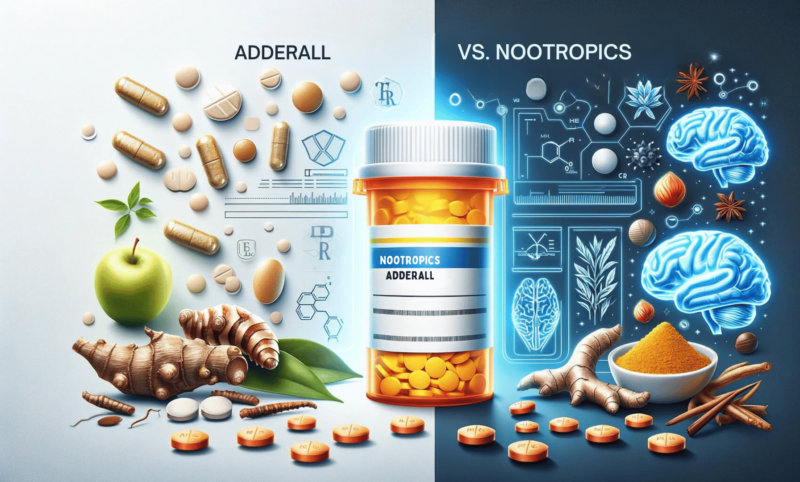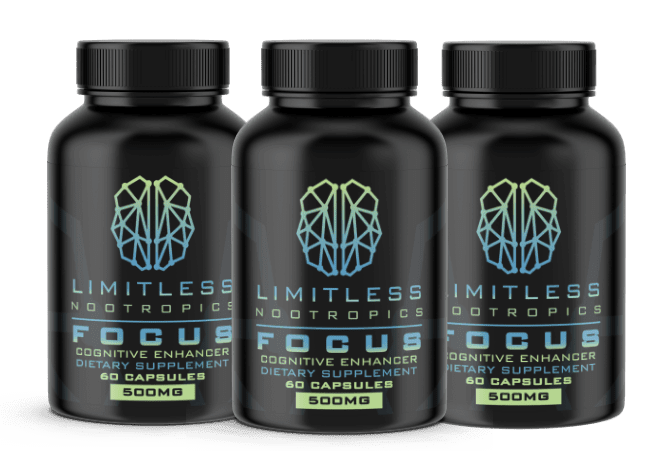In today’s fast-paced world, the demand for cognitive enhancers has skyrocketed.
Currently the debate is with nootropics vs Adderall.
Adderall, a prescription medication, and nootropics, a class of supplements, are among the top choices for improving focus, memory, and overall brain function.
This article delves into a detailed comparison between these two options to help you make an informed decision.
Understanding Adderall
Adderall is a prescription stimulant that combines amphetamine and dextroamphetamine. It is commonly prescribed to treat Attention Deficit Hyperactivity Disorder (ADHD) and narcolepsy.
Adderall works by increasing dopamine and norepinephrine levels in the brain, which enhances attention and reduces impulsivity.
Common Side Effects of Adderall:
- Anxiety
- Restlessness
- Headaches
- Loss of appetite
- Insomnia
- Potential for addiction
Adderall is highly effective for many, but its potential for addiction and side effects can be concerning.
For more on the implications of Adderall, you can refer to this Adderall study.
What are Nootropics?
Nootropics, also known as “smart drugs,” are substances that claim to improve cognitive function.
Unlike Adderall, nootropics are typically natural compounds and are not regulated by the FDA.
This makes them more accessible but also less proven in terms of efficacy and safety.
Common Nootropics and Their Benefits:
- Bacopa Monnieri: Enhances memory and focus. Recommended dose: 300mg daily.
- L-theanine: Reduces stress and anxiety without causing drowsiness. Recommended dose: 200-400mg daily.
- Rhodiola Rosea: Helps the body handle stress better. Recommended dose varies.
- Panax Ginseng: Improves various aspects of cognitive performance.
- Lion’s Mane Mushroom: Stimulates brain cell growth.
While these supplements have shown promise in various studies, their effectiveness is mostly supported by anecdotal evidence.
Comparing Adderall and Nootropics
| Feature | Adderall | Nootropics |
|---|---|---|
| Prescription Required | Yes | No |
| Potential Side Effects |
|
|
| FDA Approved | Yes | No |
| Non-addictive | No | Yes |
| All Natural | No | Yes |
| Duration of Effects |
|
Up to 12 hours |
| Usage | 1-3 times a day | As needed for optimal cognitive function, 1-3 times a day |
ChoosING Nootropics vs Adderall
- Non-Addictive: Unlike Adderall, nootropics are generally non-addictive, making them a safer long-term option.
- Fewer Side Effects: Many nootropics have fewer and milder side effects compared to Adderall.
- Natural Ingredients: Nootropics often use natural ingredients, appealing to those seeking a more holistic approach.
Limitless Focus
Our product, Focus, is a meticulously crafted nootropic supplement designed to enhance cognitive function, eliminate brain fog, improve short-term memory, and help you focus better on tasks.
Focus is 100% vegan, non-GMO, and gluten-free, ensuring that it meets the highest standards of quality and purity.
Each ingredient in Focus serves a specific purpose and contributes to overall brain health and function.
Key Ingredients in Focus
- Choline DMAE (Dimethylaminoethanol):
- Role: Choline DMAE is an amino alcohol that is naturally found in small quantities in the brain. It is a precursor to acetylcholine, a neurotransmitter crucial for memory, learning, and attention.
- Benefits: Enhances memory, improves focus, and supports overall cognitive health.
- Turmeric Extract:
- Role: Turmeric is known for its anti-inflammatory and antioxidant properties.
- Benefits: Helps reduce brain inflammation, supports cognitive function, and may improve mood.
- Barley Extract (Hordeum vulgare):
- Role: Barley is rich in vitamins, minerals, and antioxidants.
- Benefits: Supports overall brain health and improves energy levels.
- Schisandra Extract:
- Role: Schisandra is an adaptogen, helping the body adapt to stress.
- Benefits: Improves mental performance, reduces fatigue, and enhances concentration.
- Bitter Orange Extract (CoQ10):
- Role: CoQ10 is a compound that helps generate energy in your cells.
- Benefits: Boosts brain energy, supports mental clarity, and improves focus.
- Caffeine:
- Role: A well-known stimulant.
- Benefits: Increases alertness, enhances concentration, and reduces the perception of fatigue.
- Vitamins B1, B6, and B12:
- Role: These vitamins are crucial for brain health.
- Benefits: Support energy production, improve mood, and enhance cognitive function.
- Taurine:
- Role: An amino acid important for neurological development.
- Benefits: Supports cognitive function, improves focus, and reduces mental fatigue.
- Glycans:
- Role: Complex carbohydrates that play a role in cell signaling.
Benefits: Support brain health and enhance cognitive functions.
Supplement Facts
| Serving Size: 1 Tablet | Amount Per Serving | %DV** |
|---|---|---|
| Turmeric Extract | 500mcg* | |
| Barley Extract (Hordeum vulgare) | 55mg* | |
| Schisandra Extract | 500mcg* | |
| Bitter Orange Extract (CoQ10) | 23mg* | 100mcg* |
| Caffeine | 35mg* | |
| B1 | 5mg* | |
| B6 | 25mg* | |
| B12 | 100mcg* | |
| Choline DMAE | 55mg* | |
| Taurine | 267mg* | |
| Glycans | 44mg* |
Conclusion
Adderall and nootropics serve different purposes and suit different needs.
If you have been diagnosed with ADHD and require a regulated treatment, Adderall might be the appropriate choice.
However, if you are seeking a natural, non-addictive supplement to boost your cognitive functions, nootropics like our Focus could be the better option.
Both Adderall and nootropics have their benefits and drawbacks.
Consulting with a healthcare provider can help you make the best decision for your individual needs and health conditions.
Frequently Asked Questions
What is the main difference between Adderall and nootropics?
Adderall is a prescription stimulant medication primarily used to treat ADHD and narcolepsy. It works by increasing the levels of dopamine and norepinephrine in the brain. Nootropics, on the other hand, are typically natural supplements that claim to enhance cognitive functions such as memory, focus, and mental clarity without the need for a prescription.
Are nootropics safer than Adderall?
Nootropics are generally considered to be safer than Adderall because they are non-addictive and often made from natural ingredients. However, their effectiveness and safety are less well-documented than Adderall, which has been extensively studied and regulated by the FDA.
Can I use nootropics and Adderall together?
Generally, yes.
It is crucial to consult with a healthcare provider before combining nootropics and Adderall. Mixing supplements and prescription medications can lead to unintended side effects and interactions.
How quickly do Adderall and nootropics work?
Adderall typically works within 30 minutes to an hour, with its effects lasting between 4 to 12 hours depending on the formulation. Nootropics can vary significantly; some may offer immediate effects, while others might require consistent use over several weeks to see noticeable benefits.
Is Adderall addictive?
Yes.
Adderall has a potential for addiction because it is a stimulant that affects the brain’s reward system. This is why it is classified as a controlled substance and requires a prescription.
Can nootropics help with ADHD?
Yes.
Some people with ADHD find that certain nootropics can help with focus and attention. However, nootropics are not a substitute for prescription medications like Adderall, and their effectiveness for ADHD is not as well-supported by scientific research.
How should I choose between Adderall and nootropics?
Choosing between Adderall and nootropics depends on your specific needs and medical conditions. If you have been diagnosed with ADHD or another condition that requires prescription medication, Adderall may be the appropriate choice. If you are looking for a natural, non-prescription option to enhance cognitive function, nootropics might be suitable. Always consult with a healthcare provider to determine the best approach for your situation.


